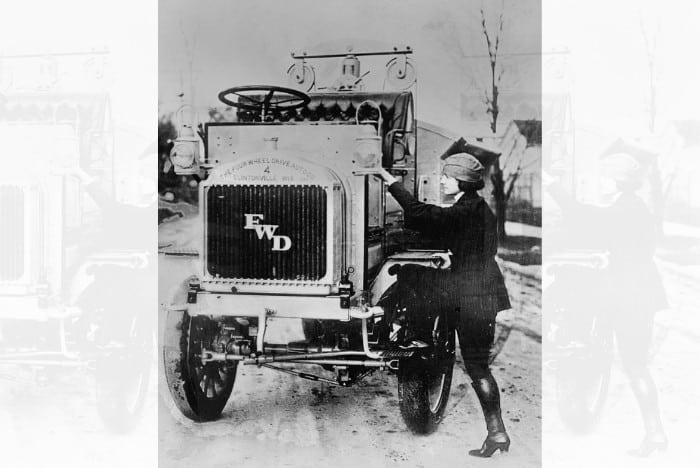Luella Bates Paves The Way For Women In Trucking
As Women’s History Month kicks off, it seemed fitting that we observe the accomplishments of Luella Bates – an iconic figure and the first professional female trucker.
Luella Bates, a trailblazer for women in the trucking industry, was born in 1887 in Michigan. She spent her early years on her family’s farm and then moved to Clintonville, Wisconsin in search of better job opportunities. During World War I, Bates began working as a truck mechanic and test driver for Four Wheel Drive Auto Co. (FWD) in Clintonville.
First Female Commercial Truck Driver
It was during this time that Bates made history as the first licensed female commercial truck driver. She earned her license in New York in 1920, after completing an interstate tour as a goodwill ambassador for FWD’s “Safety First” advertising campaign. The tour was a success, and Bates visited 25 towns to promote the safe use of commercial trucks.
Bates continued to work for FWD until 1944 when she retired. Throughout her career, she was an advocate for women’s rights in the workplace, particularly in the transportation industry. She believed that women could do anything that men could do and worked hard to prove that point.
Bates’ contributions to the trucking industry were not limited to her driving abilities. She also worked as a truck inspector and helped to train other drivers. Her hard work and dedication to the industry paved the way for other women to pursue careers in trucking.
Women in Trucking
Today, women make up a significant portion of the trucking industry, with nearly 10% of all truck drivers being female. However, there is still work to be done to achieve gender equality in this field. Organizations like the Women In Trucking Association continue to advocate for women in the industry and celebrate the accomplishments of women like Luella Bates.
- According to the American Trucking Association (ATA), women make up 24% of the transportation industry’s office and administrative workforce, but only 7.89% of the trucking industry’s driver workforce.
- In 2019, the Women In Trucking Association reported that the number of female drivers had increased by 68% since 2010.
- The ATA projected that the trucking industry will need to hire more than 1.1 million new drivers over the next decade to keep up with demand. Encouraging more women to enter the field could help address this shortage.
- According to a survey conducted by the Women In Trucking Association, women who work in the trucking industry report high levels of job satisfaction and feel that they are treated fairly.
- Despite the challenges, many women find success in the trucking industry. In 2020, Trucker News reported on several female truck drivers who had achieved significant milestones, including driving over one million miles without an accident.
These statistics demonstrate that while women are still underrepresented in the trucking industry, there are opportunities for women to thrive in this field. Organizations like the Women In Trucking Association are working to promote gender diversity and encourage more women to pursue careers in trucking.
Luella Bates was a true pioneer in the trucking industry, and her story serves as an inspiration to Chief Carriers and women everywhere. She paved the way for future generations of women, like our very own Liz Alvarez, to pursue careers in the transportation industry, and her legacy will continue to live on.

In 2021, Liz began the CDL program at Hastings CCC, and fate touched her life again when she met Driver Recruiter Mandee Lade. She accepted the invitation to tour the Chief home base and learn more about flatbed, where she crossed paths with our very own shining star on the road in the form of Jolene Franzen. Liz had never been one to enjoy sitting still and knew that her sense of determination would carry her all of the way to the finish line in terms of the challenges flatbed operation offers.
The trucking industry has come a long way since Luella Bates took to the road in 1920. And yes, Liz is part of the next generation of women in trucking. But, we have a long ways to go too. Non-profit organizations like The Next Generation in Trucking Association are engaging and training talented individuals like Liz Alvarez by partnering with high schools, community/technical colleges, and private schools.
The Next Generation in Trucking Association is a non-profit trade association that is engaging and training the next generation of trucking industry professionals by partnering with high schools, community/technical colleges, and private schools to launch training programs around the United States.
At Chief Carriers, we’re diligently working to recruit the best talent in the industry. We want to be part of the change in the next generation of women in trucking. All females employed at Chief Carriers have the opportunity to be a member of the Women’s Council.

